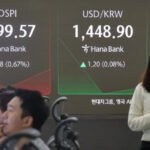ITC light rail line station rendering
Woojin Industrial Systems Co., a South Korean railway vehicle manufacturer, said on Friday that it has been selected as the preferred bidder for the Inglewood Transit Connector (ITC) light rail project in Inglewood, California, a project led by the City of Inglewood in Los Angeles County.
Woojin Industrial Systems is participating in the project as part of the “Elevate Inglewood Partners (EIP) consortium,” which includes the US infrastructure technology company Parsons Corp. Woojin will supply light rail vehicles and be responsible for their operation and maintenance for 30 years.
The ITC project involves the construction of a 2.6 km (1.6 miles) line that will connect it with the LA Metro K-Line and major facilities in Inglewood, including the Kia Forum and YouTube Theater.
Funding from the US Department of Transportation was approved in Dec. last year.
Woojin Industrial Systems plans to finalize the contract by the end of this year, proceed with design and construction and deliver the first batch of the vehicles by early 2028.
The total project cost is about $2 billion, with Woojin’s expected revenue estimated to exceed $300 million. The company also anticipates securing around $73 million in annual revenue from operations over the 30-year period.
In May this year, Woojin also secured a $210 million contract to upgrade LA Metro’s electric trains.
By Hyung-Chang Choi
calling@hankyung.com















